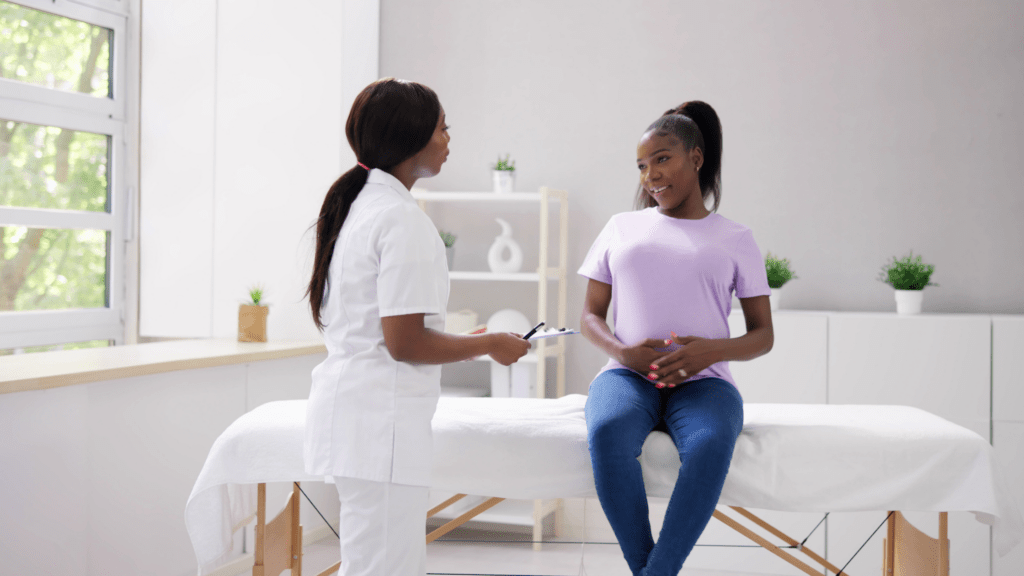How to Prepare Your Body for Conception

You are at the start of your journey towards parenthood, so preparing your body for pregnancy is probably at the front of your mind. We are sure you know from speaking with your friends and family that no journey towards starting a family is the same. However, there are important steps that you and your partner can take to improve your chance of conception.
It’s never too early to start preparing your body for pregnancy, and it has long been advised that people trying to get pregnant should maintain a healthy lifestyle and reduce their exposure to harmful substances. This advice is not just to get the female body ready for conception but to improve male fertility and the health of sperm to support conception. Remember, both you and your partner should be getting your bodies as healthy as possible while you are preparing to conceive.

Healthy lifestyle
Having a healthy lifestyle is a holistic endeavour. So, whether you are between pregnancies or taking your first steps towards starting a family, preparing your body and mind for pregnancy can increase your chances of having a healthy baby.
Physical exercise
Recommendations vary depending on the intensity of the workout. However, a good rule of thumb for adults to get around 2 1/2 hours of moderate-intensity exercise a week or around 30 minutes a day.
If you are starting from square one with your physical health, going on brisk walks is a great way to get started.
Physical activity helps to maintain a healthy weight, reduce the risk of premature birth and reduce high blood pressure.
High blood pressure can cause problems during pregnancy and, in severe cases, can limit the amount of blood that gets to your growing baby.
Talk to your health care provider if you are at risk of:
- Heart disease
- Stroke
- Diabetes
- Injury
- Disability
- Damaging recent surgery
Healthy Weight
Maintaining a healthy weight is important for preparing your body for pregnancy. Being underweight, overweight or obese will increase the risk of having complications, such as heart disease, high blood pressure, diabetes and certain types of cancer.
Diabetes occurs when there is too much sugar in the blood. This can then damage the kidneys, eyes and nerves.
It’s not necessarily a good idea to lose weight during pregnancy, so having a healthy weight before you become pregnant is a good goal.
Sleep
Sleep is the foundation that the rest of your healthy lifestyle is built on. If you don’t get good quality sleep, you will notice the impact on your healthy eating and your willingness to do exercise.
Stress and mental well-being
Feeling mentally healthy is crucial for your journey into parenthood. Take the time to find ways to manage your stress. Try yoga, meditation, deep-breathing exercises, or any other activity that brings you joy.
If you feel emotions, such as anxiety, stress or depression, for an extended period of time or to the extent that they interfere with your daily life, get professional help.
Seeing a counsellor to help you reduce and manage your stress can be beneficial. Additionally, seek help if you have experienced any abuse from your partner.
Having sex
Having regular sex will, of course, help you to conceive. The reason we have listed it here under well-being is because it’s important for it to be enjoyable and fun. Try not to restort to a schedule initially, as it might drain some of the passion from your relationship and have an impact on other areas of your relationship and well-being if you start to see sex as a chore.
If you don’t have known fertility issues, focus on having frequent, spontaneous sex.
According to the NHS, “More than 8 out of 10 couples[…]will conceive naturally within a year if they have regular unprotected sex (every 2 or 3 days).” However, if you are still trying to get pregnant after your first year, it is advised to go to your GP. You might also find that during this time that you need additional support from experts and our supportive community.
Alcohol, drugs and Smoking
Smoking
Smoking during pregnancy may cause premature birth, congenital disabilities and infant deaths. It can negatively affect sperm count, make it harder for you to recover from pregnancy and cause greater health risks for a child later in life.
Alcohol
Drinking alcohol even in small amounts can cause health problems. The effects of drinking alcohol during pregnancy can cause long-term problems, such as an intellectual disability or facial and heart defects. Hence, it is better not to drink alcohol while you are pregnant.
Recreational drugs
Taking drugs like cocaine or cannabis can cause serious health problems for your baby. Stop taking these substances before you start trying to get pregnant.
If you need support, contact FRANK for friendly, confidential advice.
Working with toxic substances
Try to avoid coming into contact with toxic substances and environmental contaminants, such as harmful chemicals, fertiliser, faeces and insect spray.

Healthy diet
Having a healthy baby starts before pregnancy and tackling what you eat is one of the biggest steps towards a healthy lifestyle. In one of our recent broadcasts, What to Eat When Trying to Conceive, Nutritional Therapist Sandra Greenbank advises, “Make it simple, food should be simple and enjoyable. One of the main things you can do is to cook more from scratch.” By cooking at home, you will avoid poor nutrition associated with takeaways and ultra-processed foods.
Become A Member to Watch the Broadcast
Food
Having a balanced diet is important for your body to receive all the vitamins and minerals it needs. It’s important to follow a healthy diet while getting your body ready for conception.
Adjust your diet by:
- Eat foods that are high in protein
- Eat fruits, vegetables, grains and dairy products
- Reduce the amount of processed foods you eat
- Reduce the amount of foods with empty calories.
Caffeine
Drinking coffee might seem like an innocent habit, but having a high caffeine intake has been linked to difficulties conceiving and greater chances of miscarriages and difficulty of conception.
Limit caffeine and reduce your intake. Remember that caffeine is found in tea, sodas and chocolate—not just your in cup of coffee.
Water
This tip is not necessarily pregnancy related, more a general reminder for good health. Try to drink around eight glasses of water a day, so keep this in mind while you are keeping your body healthy.

Pregnancy planning
Pre-conception health can help prevent complications in pregnancy. It’s a good idea to start focusing on your health at least three months before you start trying to conceive.
Contraception
It might seem obvious, but putting a stop to your current birth control will vastly increase your chances of becoming pregnant. Resuming a natural menstrual cycle might take a few months or a few weeks, depending on your current contraception.
Track your menstrual cycle
Whether you’ve been on birth control or not, it’s a good idea to be tracking your menstrual cycle. You will need this information to be able to your most fertile times in the month. While tracking your cycle, note any irregular bleeding, spotting or differences in length.
Supplements
To have a healthy pregnancy, you might need to take additional supplements, this will also aid conception.
Folic acid supplements
Folic acid supplement is a B vitamin. It is advised to start taking folic acid supplements at least a month before and during pregnancy. The daily suggested intake is 400 micrograms of folic acid each day. This is usually taken as a supplement however folic acid is also found naturally in foods and is called folate. Folate can be found in fortified foods, such as bread, cereals, pasta, beans, leafy greens and broccoli.
Folic acid is needed in your body for healthy growth and development. It can prevent major birth defects in your baby’s developing brain and spine (anencephaly and neural tube defects NTDs like spina bifida.)
Prenatal supplements
In addition to taking folic acid, you may want to take multivitamins pills or prenatal vitamins, which will include the full spectrum of vitamins needed.
If you do not want to take a prenatal vitamin supplement, then eating a balanced diet rich in antioxidants and getting enough vitamin C will help keep your immune system strong.
Vaccines
At some point, either before or during your pregnancy, it is likely you will have to decide whether or not to take medication or vaccines. Most vaccines are safe to take when you are getting your body ready for pregnancy moreover many are recommended.
You will need to discuss your options with your health care provider, as they will have a better understanding of your medical conditions and how best to prepare your body for pregnancy.
Visit your health care provider
This final suggestion is not necessarily about getting your body ready for pregnancy but about understanding your current health status and conditions. It is important to bear in mind that the risks of pregnancy increase over the age of 35. It also gets harder to get pregnant as you get older. Discuss this further with your health care provider.
Regardless of your age, it’s a good idea to have a pre-conception health check-up. A preconception health check-up can include:
- Blood tests
- Pelvic exam
- Smear test
- Body mass index calculation
- Blood pressure
- Breathing rate
- Body temperature
- Sexually transmitted infection tests
If you are based in the UK, you will be offered screening for sickle cell and thalassaemia. These are both inherited blood disorders. They mainly affect people whose ancestors come from Africa, the Caribbean, the Mediterranean, India, Pakistan, the Middle East, and South East Asia. You can get tested for this anytime before your pregnancy. Find out more about screening for sickle cell and thalassaemia in pregnancy.
It will give you a chance to discuss any previous pregnancy problems, prescriptions, and over the counter medicines you are taking, some of which might not be safe during pregnancy. Additionally, you might need to update your vaccines and look back into your family’s health history.
Even if you have had a child before, your health may have changed, so it’s good to have an up to date discussion.
Family medical history
Learn about your family health history to be informed of any health problems that might occur during your pregnancy. Depending on your family history, you may be referred to genetic counselling. Genetic counselling can guide you through various issues, such as miscarriages, infant deaths, infertility, genetic conditions and congenital disabilities.
Visit the dentist
While you are getting your pregnancy check-up, it’s a good idea to get your teeth checked out too. While you are pregnant, your hormones might affect your gum health, so it’s better to get ahead of any problems you have when preparing your body for conception.
Become a Member
The IVF Network has a team of experts, events and a supportive community ready and waiting to answer any other burning questions you have. Whether you’re at the start of your conception journey, your fertility treatment or growing your family, we are on hand to help.